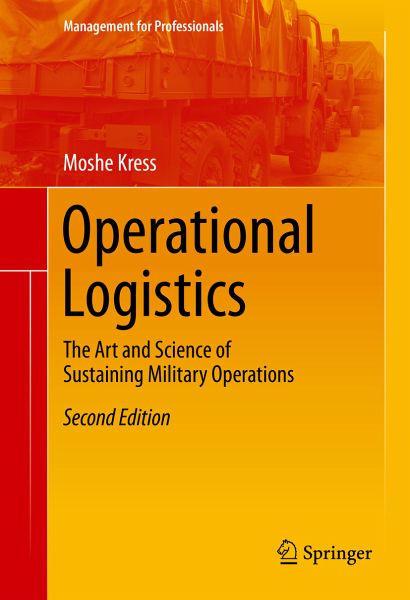
Operational Logistics (eBook, PDF)
The Art and Science of Sustaining Military Operations
Versandkostenfrei!
Sofort per Download lieferbar
40,95 €
inkl. MwSt.
Weitere Ausgaben:

PAYBACK Punkte
20 °P sammeln!
This book explores the theoretical foundations and applications of military operational logistics (OpLog). OpLog theory has two facets: qualitative and quantitative.The qualitative facet is imbedded in the theory of operational level of war or operational art. It includes principles, imperatives and tenets, which are stated and analyzed in the first few chapters. The quantitative facet relates to the scientific aspects of OpLog. It is manifested by formal network models representing structural and operational features of an OpLog system. The book examines the two facets and integrates them int...
This book explores the theoretical foundations and applications of military operational logistics (OpLog). OpLog theory has two facets: qualitative and quantitative.The qualitative facet is imbedded in the theory of operational level of war or operational art. It includes principles, imperatives and tenets, which are stated and analyzed in the first few chapters. The quantitative facet relates to the scientific aspects of OpLog. It is manifested by formal network models representing structural and operational features of an OpLog system. The book examines the two facets and integrates them into a unified presentation. Important OpLog applications a re described and discussed.
Chapter 1 presents a general introduction to military logistics. Chapter 2 discusses the px;font-family: monospace;">general structure and characteristics of logistics and describes its three levels - strategic, operational and tactical. Chapter 3 describes the foundation of OpLog. Chapter 4 deals with OpLog planning. Chapter 5 addresses the issue of logistic information, and Chapter 6 deals with forecasting logistic demands. Chapters 7 and 8 are new additions to this second edition. They address logistics aspects of two contemporary operational topics - insurgencies and humanitarian assistance.Chapter 9 describes the first version of the logistic network model. Chapter 10 addresses an important OpLog characteristic - Flexibility. Chapter 11 discusses two major challenges in OpLog practice: force accumulation, 4419px; font-family: monospace;">and medical treatment and evacuation. Chapter 12 presents an inter-temporal network optimization model designed to determine deployment and employment of 3333px;font-family: monospace;">the OpLog support chain during military operations.
Chapter 1 presents a general introduction to military logistics. Chapter 2 discusses the px;font-family: monospace;">general structure and characteristics of logistics and describes its three levels - strategic, operational and tactical. Chapter 3 describes the foundation of OpLog. Chapter 4 deals with OpLog planning. Chapter 5 addresses the issue of logistic information, and Chapter 6 deals with forecasting logistic demands. Chapters 7 and 8 are new additions to this second edition. They address logistics aspects of two contemporary operational topics - insurgencies and humanitarian assistance.Chapter 9 describes the first version of the logistic network model. Chapter 10 addresses an important OpLog characteristic - Flexibility. Chapter 11 discusses two major challenges in OpLog practice: force accumulation, 4419px; font-family: monospace;">and medical treatment and evacuation. Chapter 12 presents an inter-temporal network optimization model designed to determine deployment and employment of 3333px;font-family: monospace;">the OpLog support chain during military operations.
Dieser Download kann aus rechtlichen Gründen nur mit Rechnungsadresse in A, B, BG, CY, CZ, D, DK, EW, E, FIN, F, GR, HR, H, IRL, I, LT, L, LR, M, NL, PL, P, R, S, SLO, SK ausgeliefert werden.












